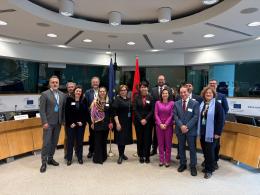European Economic
and Social Committee
Utvidgningsländerna
EESK deltar aktivt i EU:s utvidgningsprocess och har utvecklat en tvådelad – regional och bilateral – strategi för förbindelserna med civilsamhällesorganisationer i utvidgningsländerna.
När det gäller den regionala strategin är uppföljningskommittén för västra Balkan – ett permanent internt EESK-organ – det främsta instrumentet för att samordna EESK:s verksamhet i denna region. Forumet för det civila samhället på västra Balkan, som anordnas vartannat år, ingår i uppföljningskommitténs arbete.
EESK samarbetar även bilateralt med länderna på västra Balkan och Turkiet. På grundval av associeringsavtal mellan dessa länder och EU, som syftar till att involvera civilsamhällesorganisationer i föranslutnings- och anslutningsprocesserna, har EESK inrättat tre gemensamma organ med företrädare för det civila samhället – med Turkiet, Montenegro och Serbien. Varje organ består av lika många medlemmar från EESK som från partnerlandet och sammanträder två gånger om året.
EESK har regelbundna kontakter och anordnar gemensamma aktiviteter med civilsamhällesorganisationer i de utvidgningsländer med vilka inget gemensamt organ med företrädare för det civila samhället ännu inrättats.
Arbetet i de gemensamma organen kompletteras med EESK-yttranden om föranslutnings- och anslutningsprocesserna i de enskilda länderna samt om frågor av regionalt intresse.

